- Home
- J. R. Ellis
The Whitby Murders (A Yorkshire Murder Mystery) Page 16
The Whitby Murders (A Yorkshire Murder Mystery) Read online
Page 16
‘Yes it is. I’d no idea you knew Andrea.’
‘Well, I can’t say I knew her well because, as I say, she was in London most of the time. I don’t think she knew what to do with the flat; whether to move back up here, rent it or sell it. I don’t think she could bear to sell it really, but I imagine the money would have come in handy.’
‘You’re right. I visited her there a few times. She kept it just like it was when her aunt lived there with all that beautiful artwork.’
Mrs Adams had started to clean the kitchen sink. ‘Yes, and I’ll tell you a funny story about that. I was due to go to the house the other day. I have my own key like I do here. Well, it was after what had happened and I thought, well, should I go or not? I decided I would. I didn’t want to see the place get really dusty. So I went and I have to say it felt really odd to be there knowing she was dead. I didn’t like it at all. And then I noticed something. When you go round a place, you get to know where everything is and if something’s been moved. A painting in the hall had been taken down.’
‘Yes, I went in there with my dad and we saw the shape on the wall where it had been hanging. Do you remember what it was?’ asked Louise.
‘Oh yes. I didn’t like it much. It was a funny picture of a man and woman. You know hugging, but when you looked closely, as I had to when I was dusting, it looked like the woman was biting the man on the neck.’ She shuddered. ‘It wasn’t nice somehow. I don’t know where Miss Barnes, that’s Andrea’s aunt, got it from.’
‘And you don’t know what happened to it?’
‘I don’t. And how are you, love? Andrea was a good friend of yours, wasn’t she?’
‘Yes she was. It’s . . . difficult.’ She gave Mrs Adams a wan smile, and the cleaner continued with her good-hearted chatter. Louise, however, found it hard to concentrate on what she was saying, because a disturbing idea had begun to form in her mind.
Back in Whitby, Oldroyd and Granger met to report back to each other. Oldroyd began. Despite the lack of real progress, he was feeling upbeat after his sea trip the previous day and a pleasant breakfast at his hotel. Deborah was doing a video session on Zoom with a client who found it difficult to leave the house due to social anxiety.
‘We need to pursue this Withington character. I think his niece Andrea Barnes was involved in some underhand dealings with him. Sergeant Johnson reported that Barnes visited Withington’s shop in Leeds. Also, Withington’s son was involved. The Leeds police seem to think he was the one who travelled round and procured stuff. Sergeant Johnson thinks that the son could be the person Barnes was seen with in London.’
‘Her cousin?’
‘Yes. If they had some long-established arrangement and Barnes wanted to pull out, Withington may not have liked it. Perhaps she knew too much about his operation.’
‘Okay, we’ll speak to Withington again and the son.’ Granger frowned at Oldroyd. ‘Withington may have had a motive, sir, but are you saying that he got her own boyfriend to kill her and then himself?’
‘I admit it sounds ridiculous, but we have to pursue all the possibilities. We don’t know what other connections there were between these characters yet. I think we’re going to find more and this is where Sergeant Carter comes in. He’s discovered that Ryerson’s reason for arriving late in Whitby and missing the escape room was bogus. Apparently he was with a woman, but the story will have to be checked out. Andy thinks we shouldn’t discount Ryerson yet because of his past relationship with Barnes. He will be investigating more of them today and we’ll see what he comes up with.’
‘Our interviews with Elaine Pesku and Philip Owen didn’t yield much. DC Hampton said Pesku was very cagey. She claimed not to know anything about the whereabouts of Hugh Preston, the owner of the escape room, or about the trick sarcophagus. Hampton felt she was keeping things back.
‘I spoke to Philip Owen, the escape-room actor, and his account of himself and his conviction for assault was plausible. It was a teenage gang thing when he was only seventeen. There’s no motive with him so I don’t feel there’s much point in pursuing him further.’ Granger paused and shook her head. ‘So it’s all pretty thin, isn’t it? Unless something crops up soon, we may have to accept the obvious solution, although I agree there are some odd things about it.’
‘We’re in what I call the grind stage,’ replied Oldroyd. ‘We need to carry on until the breakthrough comes.’
At that moment, Granger’s phone rang. She listened intently, asking a few brief questions before putting the phone down. ‘Well, talking of breakthroughs, there’s some worrying news but it might prove significant. Hull police have been in touch. Hugh Preston’s wife contacted them to say her husband has gone missing. He’s not answering his phone and she’s tried everywhere she can think of where he might be. Apparently he travels a lot to places where he has these escape rooms and he’s not good at keeping in touch, but it’s unlike him to go so long without letting her know where he is.’
Oldroyd whistled. ‘He knew about the sarcophagus trick and we don’t know who else he told about it. He could be in great danger and we may be too late.’
‘I suppose it’s possible that he heard about what happened in the escape room here and then ran off because he thought he might be blamed in some way.’
‘Unlikely,’ replied Oldroyd. ‘So Pesku’s story about him having an office in Sheffield was false?’
‘Yes, but it may have been a genuine mistake. He lived in Driffield, you know, just north of Hull. He had an office there, so it’s possible she misunderstood what he said, particularly because English is not her first language.’
‘Hmm, well, maybe, or is that what we’re meant to think? It caused us to waste our efforts contacting Sheffield police.’
‘Buying time for what?’
Oldroyd shrugged. ‘To complete whatever the plan is, and we don’t know what that is yet. But Preston’s disappearance suggests to me again that we don’t yet understand what’s really going on in this case.’
‘What do you think our next move should be then, sir?’
‘Help Hull police to find Hugh Preston. Other than that, I’m not sure there’s much more we can do at this end. We need to see what Andy will come up with in the next few days.’
Five
From Whinny-muir whence thou may’st pass,
Every nighte and alle,
To Brig o’ Dread thou com’st at last,
And Christe receive thy saule.
From the Lyke Wake Dirge
On the same Wednesday morning, Maggie Hinton looked out of the window of Café Nico onto the autumnal London street where large orange and yellow leaves were falling from the plane trees onto the pavement. The café was busy and she was glad to be back in London and at work. She was beginning to feel some sense of normality returning, but it was still on the surface. If she thought about the events in Whitby, she immediately felt anxiety welling up inside her, but at least they’d done what they could. She was glad she and Mark were out of it. The worst was now over.
The whole affair had given her the chance to reassess her life. She could think about this while she performed the tasks in the café on auto pilot, she was so familiar with them. She didn’t intend to stay in the café for the rest of her life, but graduate employment opportunities were poor. Like many of her generation, she found it difficult to see how she would ever be able to do the things her parents had done and taken for granted: buy a house, raise a family, have a secure, well-paid job, retire on a good pension. Not that she necessarily wanted to follow this pattern, which seemed stifling and conformist, but as an Oxbridge graduate, she hoped to achieve something reasonably substantial in the world.
Maybe it was her fault. She’d done her work in the refuge with Louise and then gone round the Far East and Australia for a year. Was it time to commit to something more long term? Doing a Masters was the first step. It was time to do some research. She would have to fund it somehow, but it would be possible.
/> The café was quite near where Mark worked and he often came in at lunchtime to have a sandwich with her and a chat. At twelve fifteen he walked in wearing his smart work clothes. She served him his coffee and a toasted sandwich. ‘Sit over in that corner.’ She nodded to the place. ‘I’m due a break.’
Soon they were sitting together at a table eating their lunch.
‘How’s it going?’ asked Mark.
‘Pretty good, though I feel wobbly if I think about what happened. I could do without that.’ She pointed to a small Halloween display around the counter: spiders’ webs and a black bat. ‘I’m sick of all that black-witches-and-spiders stuff. But apart from that . . . I’ve never enjoyed work so much. I’m just glad to be away from that spooky town. It’ll be a long time before I go back if ever.
‘More important,’ she continued, sounding excited, ‘I’ve been thinking; I’m definitely going to do the Masters.’
‘That’s great to hear,’ said Mark, eating a piece of his mozzarella and cherry tomato panini. ‘What in?’
‘I’m going to do the Psychology Conversion. You can do it at St Catherine’s. I did quite a bit of counselling at the refuge and enjoyed it. I think I’d enjoy being a therapist.’
‘You’d be brilliant,’ said Mark, leaning over and grasping her hand. ‘I’m so pleased. When everything’s settled down life’s going to be great again.’
A sad thought came over Maggie. ‘It won’t be the same without Dom and Andrea though, will it?’
Mark frowned at her. ‘Won’t it? I know it’s tragic and terrible and so on, but they were a bit of a pain, weren’t they?’
‘Mark!’
‘They were though, weren’t they? Be honest. Always bickering, holding things up, spoiling the atmosphere. Our friendship group’s going to be much more harmonious without them.’
Maggie was shocked. She put down her tuna sandwich. ‘That’s really unfeeling. How can you talk about them like that?’
Mark looked a little sheepish as he ate some more panini. ‘Sorry, but whenever I was with them they never seemed happy. I suppose I haven’t known them as long as you, so I don’t have the attachment you have.’
Maggie took a bite of her sandwich and glared at him. ‘The fact is you didn’t like Dom because you never forgave him for copying your essay.’
‘Oh God! Don’t bring that up again.’ He seemed really angry.
‘It’s true though, but I don’t know what you had against Andrea.’
‘Look, I didn’t have anything against her, okay? It was just the two of them together; it was bad chemistry and . . . Oh, let’s just forget it.’
After this they were silent for a while and then spoke briefly to discuss what they were doing that evening. Mark left shortly afterwards.
Maggie returned to work. As she operated the espresso machine, she reflected on Mark’s uncharacteristic attitude and behaviour. It was true that Dom and Andrea had never really been his friends and that there was history between him and Dom. She could see how from his point of view their group would seem better without them and their prickly relationship. But still . . .
Andy and Jenkins arrived at the address in Tower Hamlets where Barnes and Holgate had shared a flat during their student days. It was in the gentrified part of the East End borough and appeared to be in a converted warehouse.
As the two policemen approached the door, a man got out of a car and walked up to them. It was a cold day, and he was wearing a coat with the collar up. His face seemed empty of expression and only his eyes gave a hint of the deep pain he was experiencing.
‘Are you Sergeant Carter?’ He had an east London accent. He held out his hand. ‘David Holgate, Dominic’s father.’ His voice faltered a moment but he quickly regained control. ‘Let’s go in.’ He produced a key and opened the door. The three went into a lift in silence up to the second floor, where Holgate opened another door.
‘Come in; this is where they lived. The police have been over it all once, but you’re from up there, aren’t you? Where it all happened,’ he said, addressing Andy. ‘You don’t sound like it.’ Andy explained that he’d been brought up in Croydon and had moved up to Yorkshire for promotion. Holgate perched on a wooden chair, looking exhausted and extremely uncomfortable to be in the flat.
‘I told the officers that came round: I don’t believe it, any of it. He wouldn’t have harmed anyone, especially Andrea. They were a close couple. And as far as killing himself, well . . .’ He stopped and shook his head as if the idea was beyond expression.
Andy and Jenkins had sat down tentatively on armchairs. ‘We have reports that they argued a lot.’
‘What couples don’t? It’s par for the course, isn’t it? I know he wouldn’t have harmed her.’ He looked away and seemed to be on the verge of tears. ‘I feel sorry for her parents; they must think our Dominic was a monster.’
Andy glanced at Jenkins, who looked sombre. Talking to shocked and bereaved people like this, especially when their loved one appeared to be the guilty party in some terrible crime, was one of the hardest jobs in policing.
‘Did your son have any enemies? Anyone who threatened him?’
‘No.’
‘What about Mark Garner, his fellow student he copied his work from?’
Holgate seemed surprised, as if he’d forgotten about the matter. ‘Oh, that. Our Dominic was definitely in the wrong there. We gave him hell about it. He nearly got himself expelled, but he admitted it in the end. That other young bloke, I know he was angry about it, but that wouldn’t be reason to kill someone surely.’
Andy tended to agree.
‘The problem with Dominic’s time as a student,’ continued Holgate, ‘was that he was on the wrong course. I don’t know why he was doing that Business Studies or whatever it was. I blame that school; they talked him into it. I think he was bored. He spent his time being in plays and stuff. He should have trained as an actor like Andrea.’
‘What about his job? Did he get on okay at work?’
‘I think so. He worked at a media company, not far from here.’
‘“Heart Productions”,’ said Andy consulting his notes again.
‘That’s right. He had to earn most of the money because Andrea didn’t get much working for that little drama group. I think they argued about money a bit.’
‘What about this flat Andrea inherited in Leeds?’
‘That caused some disagreements. I think Andrea would have moved up there. She didn’t really want to sell that place. It belonged to her aunt, didn’t it?’
‘Yes.’
‘Dominic wouldn’t move. He would have had to find another job and he’s not a northerner.’
Me neither, thought Andy, though I’m really happy up there.
‘She would have rented it out or sold it eventually. That would have helped their money worries.’
‘So their finances were actually improving when they . . . died?’ asked Andy as gently as he could.
‘Yes,’ said Holgate with a deep sigh as he was reminded of the shocking reality of what had happened.
‘To your knowledge, did your son ever possess a gun or a knife?’
Holgate scoffed at this. ‘I never saw him with a knife, unless he was sitting at the dining table. And as for a gun, he wouldn’t have had any idea what to do with one.’
‘Apparently he told his friends that he had a gun which his uncle had given him.’
Holgate looked momentarily surprised but then nodded his head.
‘Our Mick? Well, I knew nothing about it, but actually it would make sense. Mick and Dominic got on well together. Mick was a bit of a wreck when he came out of the army after what he’d seen in Afghanistan, I wouldn’t be surprised if he’d hung onto some guns. He got a bit paranoid. I didn’t know he’d given one to Dominic. And you’re saying that he took one with him up to Whitby and shot himself with it after he’d stabbed Andrea to death with a knife. That’s bloody ridiculous!’ He was starting to get angry and agitated. He
got up from his chair and angrily stabbed his finger at Andy, who stepped in to calm him down.
‘Look, Mr Holgate. That appears to be what happened, but we’re not entirely convinced. That’s why we’re continuing with the investigation, so if there’s anything you can think of that might help, it’s important to tell us. Please sit down.’
Holgate seemed to collapse back into his chair and his head drooped forward. ‘I’m sorry. I can’t think of anything. He was never violent, and I think he loved Andrea. If someone killed him I’ve no idea who or why. The only thing I do know is that this is destroying my wife. She’ll never be the same again.’ He sighed and seemed to pull himself together again. ‘Anyway, the police down here said you wanted to have a look round the flat. You may as well get on with it.’
‘Okay,’ said Andy. ‘We appreciate this, Mr Holgate. We know how difficult it is for you.’
Holgate nodded and remained still and silent in his chair while the detectives searched the flat. The couple’s computer and laptop had already been taken away for analysis. There was nothing of interest apart from a collection of unusual clothes and masks in a large chest. Andy asked about this.
‘Oh, they used to call that the dressing-up box. They were fond of fancy dress and playing odd characters. It was part of their love of acting. They liked any excuse for putting on a strange outfit.’
Just as they did for the escape room on that fateful day, thought Andy.
Oldroyd and DC Hampton walked down Church Street to pay another visit to Withington’s jeweller’s. Oldroyd noticed the subtle changes in the ghoulish shop displays from the Dracula and steampunk of the goths to the witches and pumpkin lanterns of Halloween. In commercial terms it was a very effective segue, which kept the horror theme going.
‘Have we established that this bloke’s a rogue, then, sir?’ asked Hampton.
‘Pretty much. He and his son have been involved in dodgy stuff for years over in Leeds and now here. There’s never been enough evidence to pin anything on them, but from our point of view, the crucial thing is that Andrea Barnes, the murder victim, was Withington’s niece and she was involved with them in some way. We need to find out if that had any bearing on this case.’

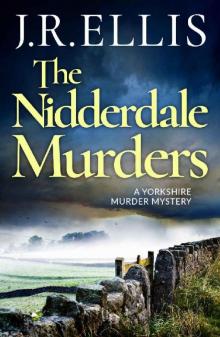 The Nidderdale Murders (A Yorkshire Murder Mystery)
The Nidderdale Murders (A Yorkshire Murder Mystery)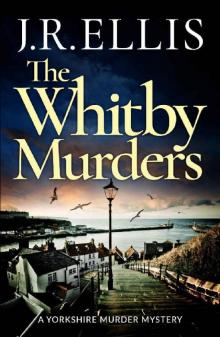 The Whitby Murders (A Yorkshire Murder Mystery)
The Whitby Murders (A Yorkshire Murder Mystery)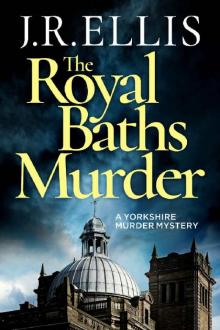 The Royal Baths Murder
The Royal Baths Murder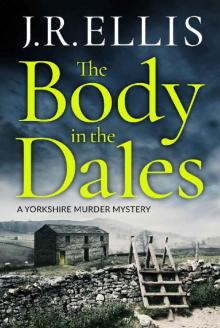 The Body in the Dales
The Body in the Dales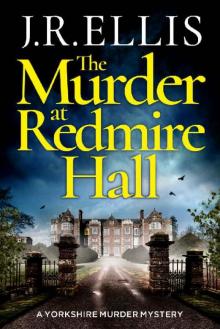 The Murder at Redmire Hall
The Murder at Redmire Hall